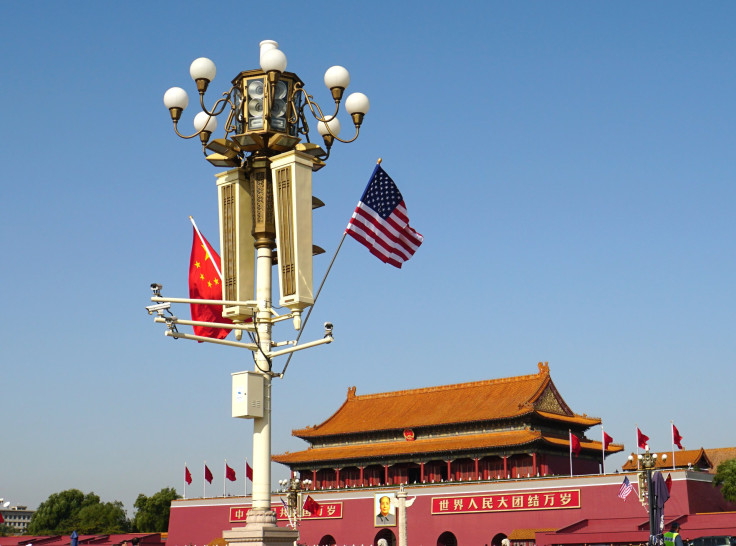China Using Arbitrary 'Exit Bans' To Stops Dozens Of US Citizens From Leaving: Report
KEY POINTS
- Up to 200 Americans may be arbitrarily detained in China, says a report
- The U.S. has warned of China using exit bans 'coercively' after 'luring individuals back from abroad'
- There is no reliable mechanism or legal process to find out how long the exit ban may last
Amid the bitter wrangling between Washington and Beijing over geopolitics and trade, at least 200 Americans may be arbitrarily detained in China and almost 30 others subject to its unlawful exit bans, according to a report.
Among the dozens of such cases, a report in the Wall Street Journal on Sunday highlighted how Henry Cai, now 61-year-old, visited China on business and has been stuck there since 2017 in what is considered the longest-running case involving a Chinese American businessman.
According to the report, Cai, who has a degree in aerospace engineering and briefly taught at the Beijing University of Aeronautics and Astronautics, left China for the U.S. in 1988, following his wife, who was then pursuing a master's degree in aerospace material science in California.
Having invested back home in a company owned by one of his former students — a Beijing maker of printed circuit boards for automobile dashboards, called Kaidisi Science and Technology Co. (KDS) — Cai visited China several times to deal with issues related to the company going bust.
In 2017, Cai visited China five times to manage issues related to his investments in the company, but during one such trip in December, he was stopped at the airport and since then has remained stuck in the country.
Despite not being charged with a crime, Cai told the Wall Street Journal (WSJ) in an interview that he fears that the deteriorating U.S.-China relations may have only worsened his case.
Meanwhile, the report quoted John Kamm, chair of the San Francisco-based Dui Hua Foundation, as saying that as many as 30 U.S. citizens are stuck in China, unable to leave the country due to the exit ban. The Dui Hua Foundation is a human rights group involved in direct dialogue with the Chinese government on the issue of at-risk detainees.
It said that there are another 200 or so Chinese Americans who are detained in China on other arbitrary grounds. According to the Dui Hua Foundation, although China's exit bans have a legal basis, the problem lies in the opaque and vague application of the laws and regulations.
The WSJ report cited legal experts who blamed the diametrically different judicial processes followed in both countries. While in China, any party in a civil dispute can ask the police to add their opponent's name to a nationwide exit ban database, in the U.S., such ban can only be ordered by a court asking foreign nationals to surrender their passport, mostly in criminal cases and very rarely in civil proceedings.
As per reports, Chinese authorities have been increasingly using the "exit ban" as a tool to enforce control over individuals and even exert diplomatic pressure on other nations. With no formal notification and limit to the duration of the ban, foreign citizens who remain stuck in China have no clear mechanism to resolve or dispute the arbitrary ban on their exit.
Given the fear among Chinese American citizens that diplomatic pressure may further complicate their cases, authorities in the U.S. are not fully aware of how many Americans may actually be stuck in China or the target of such exit bans, the WSJ reported.
In January 2019, the State Department warned those traveling to China to "exercise increased caution," pointing out that U.S. citizens could be prevented from leaving China due to its "coercive" use of exit bans. According to the travel advisory, Chinese Americans could face additional scrutiny or harassment.
Warning that "China uses exit bans coercively," the State Department cautioned, "to compel U.S. citizens to participate in Chinese government investigations, to lure individuals back to China from abroad, and to aid Chinese authorities in resolving civil disputes in favor of Chinese parties."
Adding to its alert due to COVID restrictions in China, the travel advisory issued by the U.S. on Oct. 26 warned that "U.S. citizens only become aware of an exit ban when they attempt to depart" China, "and there is no reliable mechanism or legal process to find out how long the ban might continue or to contest it in a court of law." It stated that "relatives, including minor children, of those under investigation" may also become subject to an exit ban.
Western governments have been calling out Beijing for its now well-known adoption of a coercive "international extralegal repatriation" program to force its dissident nationals abroad or people of Chinese origins to return to China.

© Copyright IBTimes 2024. All rights reserved.






















